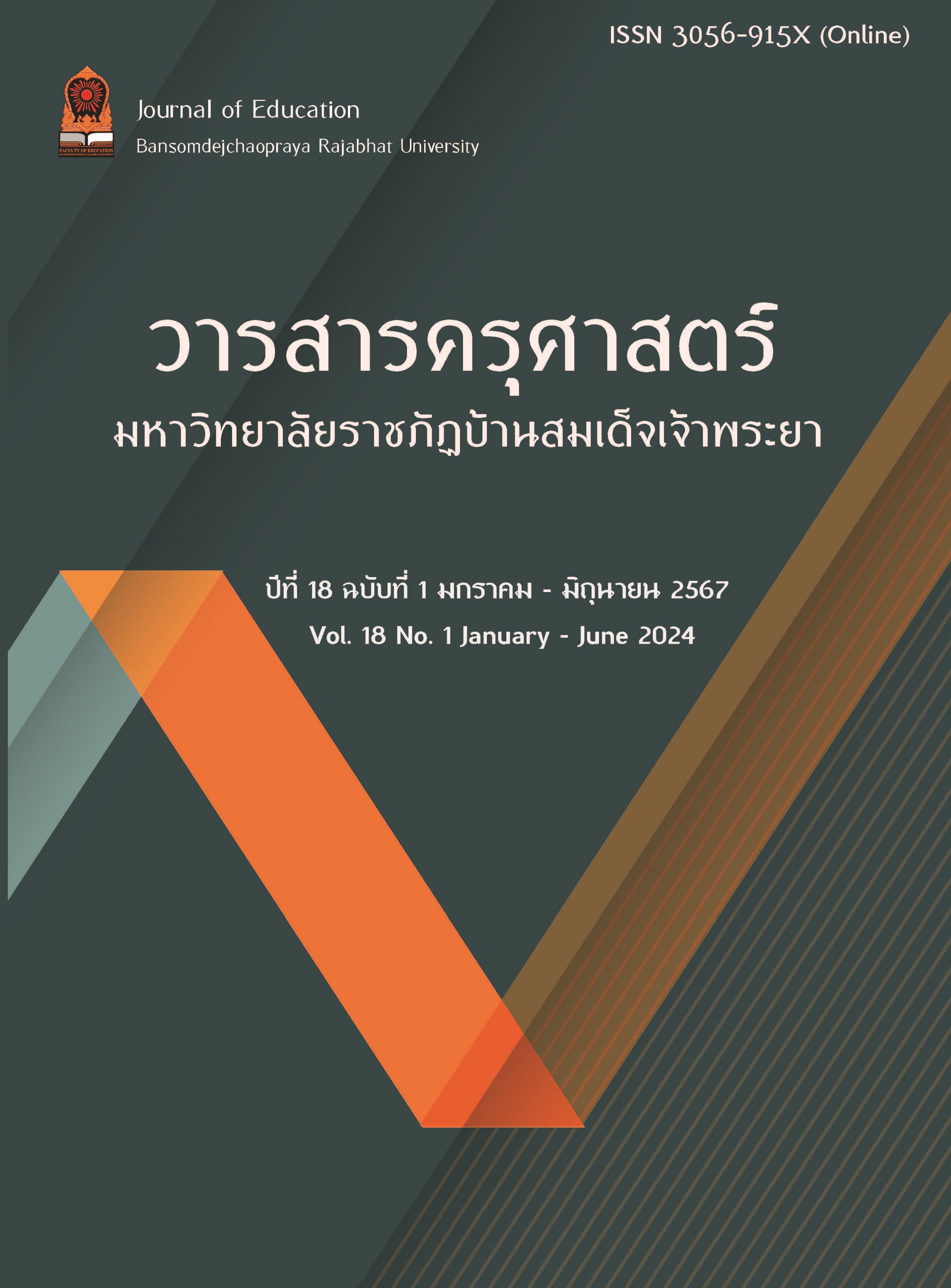Development of Academic Achievement in the Mathematics By organizing learning using Think-pair-share technique
Keywords:
Pythagorean theorem, Think-pair-share, T-test for dependent samples, T-test for one samplesAbstract
This research aims to 1) compare the mathematics achievement before and after the implementation of the Think-pair-share technique. 2) compare the mathematics achievement after the implementation of the Think-pair-share technique on the Pythagorean theorem of Mathayom 2 students with the criterion of 70 percent. 3) study the satisfaction of students towards the implementation of the Think-pair-share technique. The samples used in this research were Mathayom 2 students in the second semester of the academic year 2023 at U Thong School, Suphan Buri, in one classroom, totaling 40 students, selected by simple random sampling. The instruments used in this research were a lesson plan, an achievement test, and a satisfaction questionnaire. The statistics used to analyze the data were percentages, means, standard deviations, and hypothesis testing using the t-test.
The research results were as follows:
1. The academic achievement of students after learning management using the Think-pair-share technique was significantly higher than before learning at the .05 level.
2. The academic achievement of students after learning management using the Think-pair-share technique was significantly higher than the 70% criterion at the .05 level.
3. The learning satisfaction of students using the Think-pair-share technique was at the highest level.
Downloads
References
กุลิสรา จิตรชญาวณิช. (2562). การจัดการเรียนรู้. กรุงเทพฯ, จุฬาลงกรณ์มหาวิทยาลัย.
จิระประภา คำภาเกะ. (2563). การพัฒนาทักษะการแก้ปัญหาทางคณิตศาสตร์เรื่องปริซึมและทรงกระบอกโดยใช้เทคนิคเพื่อนคู่คิดร่วมกับเกมคณิตศาสตร์ ของนักเรียนชั้นมัธยมศึกษาปีที่ 2. วิทยานิพนธ์ ศาสตรมหาบัณฑิต, สาขาวิชาคณิตศาสตร์ศึกษา แผน ก แบบ ก, มหาวิทยาลัยศิลปากร.
ทิพย์วรรณ จันทร์เขียว. (2564). การจัดการเรียนรู้โดยใช้กระบวนการแก้ปัญหาเชิงสร้างสรรค์ร่วมกับเทคนิคเพื่อนคู่คิด (Think-Pair-Share) ที่มีต่อความสามารถในการแก้ปัญหาเชิงสร้างสรรค์ทางคณิตศาสตร์ของนักเรียนชั้นมัธยมศึกษาปีที่ 1. ปริญญานิพนธ์มหาบัณฑิต, สาขาวิชาวิทยาการทางการศึกษาและการจัดการเรียนรู้, มหาวิทยาลัยศรีนครินทรวิโรฒ.
ทิศนา แขมมณี. (2555). ศาสตร์การสอน:องค์ความรู้เพื่อการจัดกระบวนการเรียนรู้ที่มีประสิทธิภาพ. กรุงเทพมหานคร, จุฬาลงกรณ์มหาวิทยาลัย.
เทพบุตร หาญมนตรี (2563). การพัฒนากิจกรรมการเรียนรู้แบบร่วมมือเทคนิคเพื่อนคู่คิดเพื่อส่งเสริมความสามารถในการแก้ปัญหา ทางคณิตศาสตร์ เรื่อง ดอกเบี้ยและมูลค่าของเงิน ของนักเรียนชั้นมัธยมศึกษาปีที่ 5. ปริญญามหาบัณฑิต, สาขาวิชาการสอนวิทยาศาสตร์และคณิตศาสตร์,มหาวิทยาลัยมหาสารคาม.
บุญชม ศรีสะอาด. (2545). การวิจัยเบื้องต้น (พิมพ์ครั้งที่ 7). กรุงเทพมหานคร, สุวีริยาสาสน์.
พิสมร ชูเอม. (2561). การพัฒนาความสามารถในการพูดของนักเรียนชั้นประถมศึกษาปีที่ 4 ด้วยการใช้เทคนิคเพื่อนคู่คิด. วิทยานิพนธ์ศาสตรมหาบัณฑิต, สาขาวิชาการสอนภาษาไทย แผน ก แบบ ก 2, มหาวิทยาลัย ศิลปากร.
สุวิทย์ มูลคํา และอรทัย มูลคํา (2545). วิธีการจัดการเรียนรู้เพื่อพัฒนาความรู้และทักษะ.กรุงเทพมหานคร, ภาพพิมพ์.
อมรรัตน์ เตยหอม (2563). ผลการเรียนรู้แบบร่วมมือด้วยเทคนิคเพื่อนคู่คิดที่มีต่อความสามารถในการให้เหตุผลและผลสัมฤทธิ์ทางคณิตศาสตร์ เรื่อง การคูณ การหาร ของนักเรียนชั้นประถมศึกษาปีที่ 4.ปริญญาครุศาสตรมหาบัณฑิต, สาขาวิชาหลักสูตรและการสอน, มหาวิทยาลัยราชภัฎวไลยอลงกรณ์ ในพระบรมราชูปถัมภ์.
Benidiktus Tanujaya และ Jeinne Mumu (2562). Department of Mathematics Education, University of Papua, Indonesia.
Downloads
Published
How to Cite
Issue
Section
License
Copyright (c) 2024 Faculty of Educaion Bansomdejchaopraya Rajabhat University

This work is licensed under a Creative Commons Attribution-NonCommercial-NoDerivatives 4.0 International License.
บทความที่ได้รับการตีพิมพ์เป็นลิขสิทธิ์ของคณะครุศาสตร์ มหาวิทยาลัยราชภัฏบ้านสมเด็จเจ้าพระยา
ข้อความที่ปรากฏในบทความแต่ละเรื่องในวารสารวิชาการเล่มนี้เป็นความคิดเห็นส่วนตัวของผู้เขียนแต่ละท่านไม่เกี่ยวข้องกับมหาวิทยาลัยราชภัฏบ้านสมเด็จเจ้าพระยา และคณาจารย์ท่านอื่นๆในมหาวิทยาลัยฯ แต่อย่างใด ความรับผิดชอบองค์ประกอบทั้งหมดของบทความแต่ละเรื่องเป็นของผู้เขียนแต่ละท่าน หากมีความผิดพลาดใดๆ ผู้เขียนแต่ละท่านจะรับผิดชอบบทความของตนเอง



